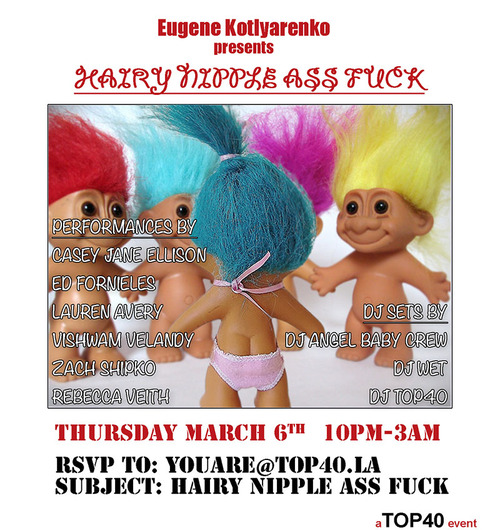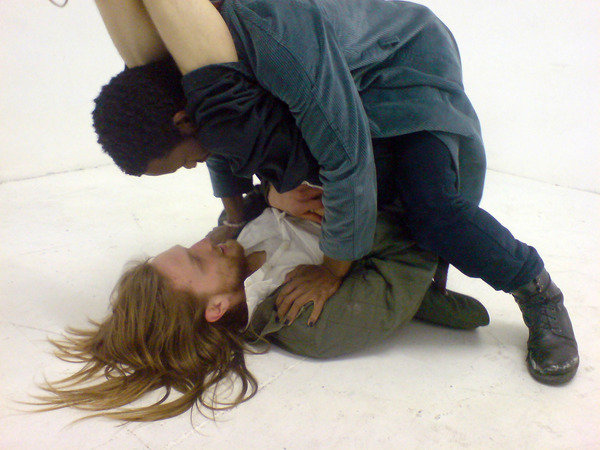
Thursday, 2:30 am, four drinks deep, at the old Night Gallery Space, some schmoe is coming around the crowd with a lockbox and deck of cards, telling us to hand over our cell phones. "None of this can be recorded, you guys." I get a pat down, give up nothing, phone tucked safely in my coat. Most get snagged with a grunt or a whine. The process is endless. My traveling companion is on his third cigarette. (If there is one redeeming quality of this VIP-themed performance series / curatorial-themed party called Top 40 that has smeared across my last few weeks, it's that you can smoke inside.)
We're recovering or repressing. We just watched one performer leave a series of messages for women he claimed to have slept with, informing them, between "uhhs.." and chuckles, that he had seen a doctor and they'd better too, because he'd just been diagnosed with HIV. Then, after endless minutes, I'm getting squashed with elbows and shoulders, alternately averting my eyes and craning for a view of the floor in front of the DJ booth, where, with frat party fanfare, Eugene Kotlyarenko's girlfriend is inserting a zucchini into his ass, and a curious, deeply unpleasant combination of boredom and offense is flowering in my insides like Giardia.
Ask Kotlyarenko and he'll tell you this feeling was "mission accomplished."1 (Perhaps his Bush-ism is nod to the level of insecurity that occasioned the explanation on his blog.) There, he writes that the evening he organized was "tepid, idiotic, done in poor taste," but this "waste of time" was on purpose. The anal sex was just a front to take away everyone's iPhones, the whole night his experiment in being a troll.
Trolls are the self-declared other to communication technologies. In folklore, they live under bridges, interrupting circulation and flow. In the 70s, the US Military capitalized on their luring connotations; "trolling" was the US Navy's preferred term for their own baiting tactics in the Vietnam War. In his words, Kotlyarenko's goal was to "employ the language" of trolling to "subvert" it. I offer him some routes of future inquiry: Trolls might reveal the falsely jolly optimism of online communication, pulling back the sheets as it copulates with the positivity of marketing. Trolls might expose the profound nationalist (and military) heritage that presents itself in white male aggression. As the Id of the internet, trolls might urge us to expand our subjectivities, compel us to identify with the aggressor rather than, as our moral habits dictate, with the victim.
Instead, Kotlyarenko misreads trolling's critical and structural function as a mere "hatred of happiness." He wanted only to "make sure [his] night would NOT BE A GOOD TIME AT ALL." At this he succeeded. But what, specifically, deserved his antagonism? And what, ultimately, did he say about trolling? #Wewon, he bragged later, cheesing for Instagram. The meme was the message. Rather than show us how trolls complicate circulation, his one-liners (Jokes over. Jokes on you.) make for easy web-ready content, whose defining feature is that it is content-less. Rather than offering insight into trolls, Kotlyarenko holds them up as impenetrable (even when he bends over) and uses them as a shield to deflect all criticism.
But meaning, to speak in troll-ready Jeff Goldblum memes, finds a way, and the rectum itself emerges as the focal point of Kotlyarenko's trolling. Kotlyarenko argued that his anal experiment was a red herring, a cheap distraction. But for it to function as such, his audience must regard anal penetration with a special kind of horror. Velandy's invocation of HIV provided that necessary, if oblique, link. More, the last time I saw Kotlyarenko perform, just days after two LAPD officers had sexually assaulted then tossed a woman out of their car, he was playing a cop at the new Night Gallery in an ill-conceived spectacle by Ben Noam. While the other faux-cop stripped into a purple thong, Kotlyarenko grunted "you like that" while Noam mimed a blowjob on his nightstick. If #Theywon, then these were context-negligent victories for straight bros who seem desperate to commodify the contours of gay sex in an exhausting effort to neutralize its power.
"Is the Rectum a Grave?" Leo Bersani famously asked, tying murderous representations of gay people and gay sex to America's criminal handling of the public health crisis of HIV/AIDS. His answer, ultimately, is yes. For Bersani, the penetrated ass, or the penetrated vagina, provokes our cultural revulsion because it represents an abdication of power intolerable to the cultural order. But if the rectum is the grave in which "the masculine ideal...is buried, then it should be celebrated for its very potential for death." Sex is our original technology for self-shattering.

Sjoerd Dijk and Dwayne Brown at a previous performance by The--Family
Saturday, 8pm, I'm seated on a cushion nuzzling a traveling companion, as Wojciech Kosma straddles Sjoerd Dijk. Their crotches pressed against each other, Kosma asserts, "every straight man should be penetrated regularly." For The--Family at Human Resources, these two straight performers spend two hours engaged in an exchange of movement and conversation, transitioning on improvisational impulse from cuddling to athletic lifts to exposing each other's junk, from bickering to sharing personal histories to revealing mutual affection. Homophilic rather than homophobic, the performance pointed back at my own expectations of sexual linearity, opting instead for a wave function of polymorphous sensuality.
In the end, Kotlyarenko misreads anal sex far more gravely than he misreads trolling. As Kosma seems to know, what sexuality can offer aesthetics (and ethics) is a platform for the improvisational giving over of control, for losses of selves never reincorporated into narratives of #winning. The ghost of anal penetration haunted Los Angeles last weekend, playing, as it often does, the synecdoche for the exercise or loss of power. As a meme, it can be appropriated for the trollish hazing (or experimental beneficence) of straight culture. But as a horizon, anal is an affirmation of our shared vulnerability, culpability, and thank god, mutually assured destruction.
1 On his blog, Kotlyarenko describes this moment as follows: "The anti-climax of seeing me mildly penetrated by a little red pepper, would provide a momentary diversion that could dull people and delay their response time as phones (uniformly iPhones) were thrown back willy-nilly." — Ed.

